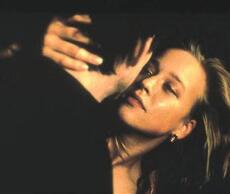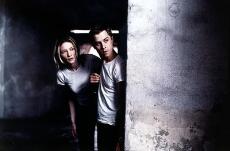Beyond Lola: Tom Tykwer’s Winter Sleepers and Heaven
by dan heaton
German writer/director Tom Tykwer received international recognition in 1998 following the release of his third film, Lola Rennt (Run Lola Run). This energetic action picture garnered the best foreign film award at Sundance and delivered a unique experience that even attracted considerable American audiences. It earned more than seven million dollars in the United States and gained a large following on home video. Lead actress Franka Potente became an international sensation and went on to star in the successful Bourne franchise. The film effectively shifted timelines and explored the possible implications of only a few minor changes in life. Tykwer’s films often explore our perceptions of time and the fateful connections between disparate characters.
Tykwer’s next picture was Krieger und die Kaiserin (The Princess and the Warrior), an emotional and equally innovative romance between two unlikely lovers. He again cast Potente, his girlfriend at the time, as the star, and the result is a magical film. Unlike its predecessor, however, this movie only made a minor impression in the U.S. market, and Tykwer has become a forgotten figure to audiences. I enjoyed both of these pictures immensely, and decided to search for more details about the talented German filmmaker. I recently viewed two additional films – Winterschläfer (Winter Sleepers) and Heaven – to gain a more comprehensive sense of his work. Their reviews are included below, but first here is some background on Tykwer:
Tom Tykwer was born in Wuppertal, Germany in 1965, and this city actually was a setting for The Princess and the Warrior. After failing to gain admission to German film school, he worked in a wide array of roles, including as a projectionist and production assistant. His feature-film debut occurred in 1993 with Die Tödliche Maria (Deadly Maria). In 1994, Tykwer co-founded the production company X-Filme Creative Pool with producer Stefan Arndt to gain more control over each project. His second film was Winter Sleepers, which gained a moderate level of interest, but it could never prepare him for the success of Run Lola Run. Tykwer currently lives in Berlin and is working on several projects set for 2005 releases.
Winter Sleepers (1997)
Starring Ulrich Matthes, Marie-Lou Sellem, Floriane Daniel, Heino Ferch, Josef Bierbichler, Laura Tonke, and Sophia Dirscherl. Directed by Tom Tykwer. Written by Anne-Francoise Pyszora (novel "Expense of Spirit") and Tom Tykwer.

The dominant role of fate to influence our actions has played a part in Tykwer’s recent films, but in those they invoke more hope than in the dreary Winter Sleepers. Stunning icy landscapes help to reveal the cold, muted nature of a small group of characters whose lives are intertwined through an auto accident. Rene (Ulrich Matthes) steals a Porsche and is nearly struck by a distracted Theo (Joseph Bierbichler) driving his horse down the road in a trailer. While Rene survives unscathed, Theo’s life is placed in turmoil when his daughter ends up in a coma. Her nurse is Laura (Marie-Lou Sellem), a quiet introverted girl with a wild roommate Rebecca (Floriane Daniel) whose callous boyfriend Marco (Heino Firch) owned the Porsche. When Rene begins dating Laura, the connections circle around and become attached in more diverse ways.
Tykwer uses this story to present a disconnection by German young people from any type of greater meaning in their lives. The prime examples of this attitude are Rebecca and Marco, who argue, break up, flirt, and get back together with no emotional attachment to their actions. Although shot wonderfully, the overall tone is bleak and difficult, with even the apparently happy moments feeling less positive than expected. Rene’s difficulties stem from a Memento-like short-term memory problem due to an old army injury. It becomes difficult for us to truly understand exactly what Rene remembers, which keeps him as a distant figure.
Tykwer’s films often deal with bleak subject matter, but none utilize such a dreary atmosphere as this picture. Each character’s difficulties in connecting also make it strenuous for the audience to retain interest in their plight. The saving grace is Tykwer’s trademark innovative visual sequences, which include a gripping final moment. Winter Sleepers achieves only a mild success, but it offers enough compelling images to warrant a recommendation for discerning viewers.
Heaven (2002)
Starring Cate Blanchett, Giovanni Ribisi, Remo Girone, Stefania Rocca, Alessandro Sperduti, and Mattia Sbragia. Directed by Tom Tykwer. Written by Krzysztof Kieslowski and Krzysztof Piesiewicz.

Renowned Polish director Krzysztof Kieslowski and his long-time writing partner Krzysztof Piesiewicz are recognized across the world for numerous films, including the Trois Couleurs (Three Colors) trilogy and The Decalogue. During the ‘90s, they planned to craft another trilogy with the titles Heaven, Hell, and Purgatory. Kieslowski’s death in 1996 occurred with only one screenplay nearly finished, so the project seemed lost. However, Tom Tykwer ultimately took the reins for Heaven in 2002 and helped to create a remarkable picture. In his first directorial job with another writer’s script, Tykwer incorporates a different tone than in his other films. However, he does retain the gorgeous cinematography of Frank Griebe and present some of his signature elements. The story covers the issues of fateful meetings and unexplained love, which Tykwer utilized perfectly in The Princess and the Warrior.
Heaven focuses on Phillipa (Cate Blanchett), a teacher in Turin, Italy with vengeance on her mind. She plants a bomb in the office of a drug dealer responsible for the deaths of her students and husband, but a twist of fate results in the unplanned deaths of four innocent victims instead. The police immediately suspect her is a terrorist, and don’t appear interested in her explanation. An exception is Fillippo (Giovanni Ribisi), a young cop who acts as the translator for the English woman during her interrogation. He inexplicably falls in love with Phillipa during a pivotal scene, and logic falls by the wayside. Fillippo is determined to help her escape to finish the job she started. But if this murder does work out, where can the couple go from there?
Although this description could be the plot for a typical action picture, these moments are unimportant to the writers, and Tykwer retains their focus on the main characters. Blanchett gives another spellbinding performance as Phillippa, and her tortured soul commands nearly every sequence. Ribisi faces the difficult task of playing the shy, mild-mannered guy with a tight personality that’s difficult to crack, but he conveys Fillippo’s traits in excellent fashion. Tykwer gives both actors plenty of moments to shine, and doesn’t overwhelm our senses with quick cutting and distracting filming techniques. Instead, he allows the moments to slowly build into something beautiful, which enhances the effect considerably.
My experience with Kieslowski’s films is very limited, so I’m unable to accurately compare his style with that of Tykwer. Adapting the work of a widely heralded figure is an almost thankless task, as little credit goes to the replacement. Steven Spielberg faced a similar fate with A.I., but he cranked the sentimentality to a fever pitch and nearly overwhelmed a possibly fascinating story. Tykwer avoids injecting too much of his signature style into Heaven, but he does provide several stunning overhead images that offer a wide view of the Italian landscape. The best scene depicts Blanchett and Ribisi far away in silhouette near a large tree as they enjoy a quiet moment near the conclusion. The camera follows them running across the hills for a significant period of time, and the overall atmosphere is more essential than a closer perspective on the actions taking place.
Copyright © 2005 erasing clouds |
|